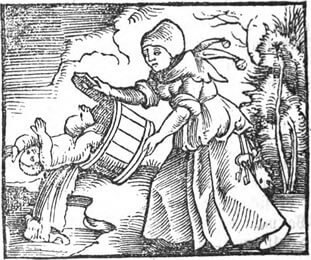From Henry VII to Elizabeth I, there are alllll of those Tudors. Wives, husbands, lovers, courtiers, headsmen with axes and swords . . . here's the place to get straight-up, low-down, historically accurate, twenty-first century interpretation on the wide and multi-generational range of players at the Tudor Court. Enjoy!
Sunday, May 29, 2016
Saturday, May 28, 2016
Eustace Chapuys - On the Receiving End of Shade for Over 400 Years - Deserved or Not?
Eustace Chapuis/Chapuys was the Spanish ambassador at the court of Henry VIII.
He is a terrific primary source for details about the people, the parties, the personal and professional in-fighting among courtiers, the pageantry and the pomp at the gilded world of the Tudor court.
At the time it all went down -
He.
Was.
THERE.
But actually.
And yet . . .
His reports and entries into the records (and the English love their records!) concerning Anne Boleyn) are often (like, all the time) slated, orthrown out entirely by touchy-feely Tudorphiles, as prejudicial, slanted, and possibly fabricated entirely for the benefit of the one signing his paycheck - Spain.
 As an imperial ambassador reporting directly to the
As an imperial ambassador reporting directly to the
holy Roman emporer, Charles V, Chapuis had opportunity to view Henry VIII's court activities; from day-to-day interactions to the big heavy 'do's where courtiers worked the room as zealously as a life insurance salesman at his high school reunion.
Chapuis sent dispatches back to Charles V.
They were filled with tart observations on the character of Henry VIII.
They were filled with tart observations on the character of members of the Boleyn clan.
They were filled with tart observations on the character of members of every clan.
The man was genius at ingratiating himself with anyone and everyone at court to whom he was allowed access; from scullion to lady's maid, no one was immune to being on the receiving end of his knowing eye, his probing questions to test allegiances amongst courtiers for possible fractures
Then he scarpered back to his rooms to write it all down.
Eventually, his notes made their way into missives; those made their way to the hands and the razor-sharp mind of Charles V - son of Catherine of Aragon's sister.
Chapuis' notes were written expressly for one of the most powerful men on the planet.
Chapuis had to get it right.
Back in Tudor times (when folks had fewer new iPhone updates with which to contend)
their brains absorbed experiences with more depth and richness than today's puny-ass brains can imagine.

Chapuis either had one heck of a photographic memory, or a trusty 4"X8'' notebook and a pencil with him at all times.
Chapuis' reports to his boss(es) can be found on British History Online. ( british-history.ac.uk )
His reports are scoldingly honest.
Not scathingly; that wouldn't have been good manners.
He called Anne Boleyn the Concubine, the Lady, the Whore, 'this Anne,' but, face it, none of those names are entirely false.
She was a kept woman.
She was a lady; Lady Anne Rochford.
She was a whore in the angry use of the word; as in, 'you big WHORE!"
And she was 'this Anne.'
Well, my dear Anne Boleyn defenders, by all means stand by your beyotch, but as my dear old inner voice often says, "Just because you don't like hearing something doesn't make it not true."
Anne Boleyn may have been a paragon of Catholic virtue.
She may have been wrongly maligned and set up by a jealous court and hardball-playing advisors to the king.
There's every chance charges against her were entirely (mostly) fabricated and consisted of a veneer of truth pasted over a mountain of lies.
There's also a chance that she was a spiteful, entitled, nasty, conceited, reactive, new-money piece of work with a great deal more style than substance.
There.
I've said it.
Chapuis wasn't the problem, just the messenger.
His job and his soul depended on telling the truth about what he saw in the secret corners and the wide open spaces of Henry VIII's court.
Imagine the ass-roasting the guy would have received from his boss if his boss made decisions based on bad information from his ambassador; it would have made your little writing-up kerfluffle on those overly-long lunch breaks look like lint on the cuff of a pair of white trousers.
Yet in a classic case of throwing out the baby with the bathwater,

Anne Boleyn enthusiasts have developed the unlovely fallback position of disregarding Chapuis' truths about her actions and/or intentions based solely on the fact that he was the Spanish ambassador.
Spanish ambassador - as if the word 'Spanish' were a get-out-of-facing-the-truth-free card.
Anne Boleyn was a tragic figure.
She was not a popular queen; she did not inspire loyalty in the hearts of most of her subjects - loyalty was reserved for Catherine of Aragon (you know, the *actual* queen,) nor was she able to manage to keep more than a scant handful of people loyal to her.
She did not deserve the extreme haircut she received; or, maybe, just maybe, she did.
For reporting the truth as he saw it, Chapuis does not deserve the extreme scepticism he receives.
He is a terrific primary source for details about the people, the parties, the personal and professional in-fighting among courtiers, the pageantry and the pomp at the gilded world of the Tudor court.
At the time it all went down -
He.
Was.
THERE.
 |
But actually.
And yet . . .
His reports and entries into the records (and the English love their records!) concerning Anne Boleyn) are often (like, all the time) slated, or
 As an imperial ambassador reporting directly to the
As an imperial ambassador reporting directly to the holy Roman emporer, Charles V, Chapuis had opportunity to view Henry VIII's court activities; from day-to-day interactions to the big heavy 'do's where courtiers worked the room as zealously as a life insurance salesman at his high school reunion.
 |
| "Oh, look. There's Chapuis. Again. Christ, he's got his business cards out. Quick, laugh like I just said something funny." |
They were filled with tart observations on the character of Henry VIII.
They were filled with tart observations on the character of members of the Boleyn clan.
They were filled with tart observations on the character of members of every clan.
The man was genius at ingratiating himself with anyone and everyone at court to whom he was allowed access; from scullion to lady's maid, no one was immune to being on the receiving end of his knowing eye, his probing questions to test allegiances amongst courtiers for possible fractures
Then he scarpered back to his rooms to write it all down.
Eventually, his notes made their way into missives; those made their way to the hands and the razor-sharp mind of Charles V - son of Catherine of Aragon's sister.
Chapuis' notes were written expressly for one of the most powerful men on the planet.
Chapuis had to get it right.
Back in Tudor times (when folks had fewer new iPhone updates with which to contend)
 |
| "Wait, whut?" |

Chapuis either had one heck of a photographic memory, or a trusty 4"X8'' notebook and a pencil with him at all times.
 |
| "And may I quote you, Lady Anne?" |
His reports are scoldingly honest.
Not scathingly; that wouldn't have been good manners.
He called Anne Boleyn the Concubine, the Lady, the Whore, 'this Anne,' but, face it, none of those names are entirely false.
She was a kept woman.
She was a lady; Lady Anne Rochford.
She was a whore in the angry use of the word; as in, 'you big WHORE!"
And she was 'this Anne.'
 |
| "This Anne I know . . . " |
Anne Boleyn may have been a paragon of Catholic virtue.
She may have been wrongly maligned and set up by a jealous court and hardball-playing advisors to the king.
There's every chance charges against her were entirely (mostly) fabricated and consisted of a veneer of truth pasted over a mountain of lies.
There's also a chance that she was a spiteful, entitled, nasty, conceited, reactive, new-money piece of work with a great deal more style than substance.
There.
I've said it.
Chapuis wasn't the problem, just the messenger.
 |
Imagine the ass-roasting the guy would have received from his boss if his boss made decisions based on bad information from his ambassador; it would have made your little writing-up kerfluffle on those overly-long lunch breaks look like lint on the cuff of a pair of white trousers.
Yet in a classic case of throwing out the baby with the bathwater,

Anne Boleyn enthusiasts have developed the unlovely fallback position of disregarding Chapuis' truths about her actions and/or intentions based solely on the fact that he was the Spanish ambassador.
Spanish ambassador - as if the word 'Spanish' were a get-out-of-facing-the-truth-free card.
Anne Boleyn was a tragic figure.
 |
| "See, Anne, we're just alike, you and me." |
She did not deserve the extreme haircut she received; or, maybe, just maybe, she did.
For reporting the truth as he saw it, Chapuis does not deserve the extreme scepticism he receives.
Subscribe to:
Posts (Atom)
